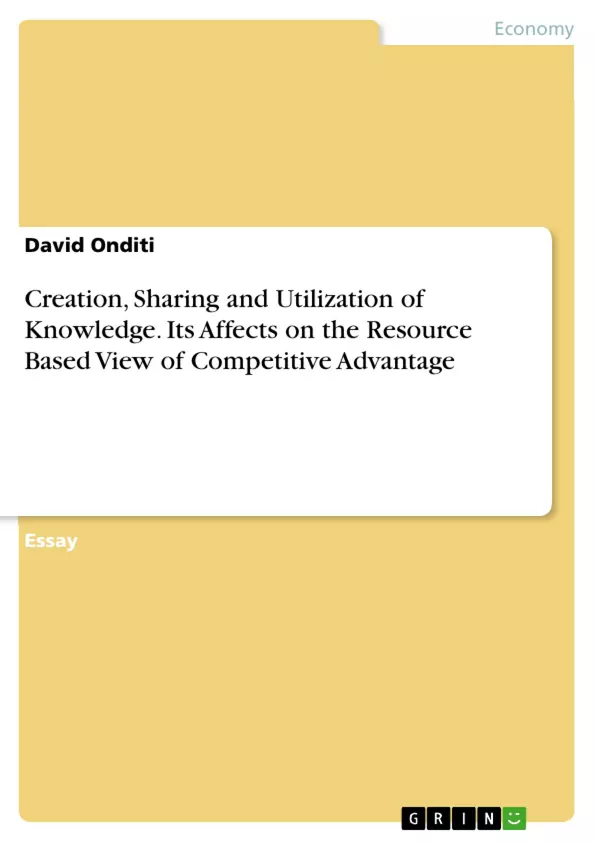This article assesses the magnitude of how the creation, sharing, and use of knowledge form the basis of an organization's competitive advantage. Therefore, the essay is based on the main factors that influence and maintain competition where we realize the proponents through which knowledge is idealized and founded, the structures and methods of knowledge formation, the role of management systems resource management scenarios, organizational status, creative structures, and management strategies. Certainly the modern founders will try to gain market advantage. Unique value that cannot be given by opponents. This uniqueness allows the team to compete with opposing teams and helps women achieve their goals.
Inhaltsverzeichnis (Table of Contents)
- INTRODUCTION
- LITERATURE REVIEW
- KNOWLEDGE CREATION CENTRALITY TO THE RESOURCE-BASED VIEW OF COMPETITIVE ADVANTAGE
- KNOWLEDGE SHARING CENTRALITY TO THE RESOURCE-BASED VIEW OF COMPETITIVE ADVANTAGE
- KNOWLEDGE UTILIZATION CENTRALITY TO THE RESOURCE-BASED VIEW OF COMPETITIVE ADVANTAGE
- CONCLUSION
Zielsetzung und Themenschwerpunkte (Objectives and Key Themes)
This article explores the significance of knowledge creation, sharing, and utilization as foundational elements for achieving a competitive advantage within an organization. It delves into the factors that contribute to and maintain competition, including the methods of knowledge formation, management systems, organizational structure, and innovative strategies. The central focus is on the unique value that knowledge provides, enabling organizations to compete effectively and reach their goals.
- Knowledge as a key driver of competitive advantage
- The role of knowledge creation, sharing, and utilization in organizational success
- The interplay between internal and external learning in knowledge formation
- The importance of organizational culture and structure in fostering knowledge management
- The relationship between knowledge and innovation in a rapidly changing market environment
Zusammenfassung der Kapitel (Chapter Summaries)
- Introduction: Introduces the concept of knowledge as a key determinant of competitive advantage and outlines the factors contributing to the formation and utilization of knowledge within organizations.
- Literature Review: Examines existing research on knowledge creation and sharing, highlighting the perspectives of various authors and exploring the different methods and strategies for knowledge management. The chapter discusses the role of both internal and external sources of knowledge and the importance of collaborative learning environments.
- Knowledge Creation Centrality to the Resource-Based View of Competitive Advantage: This chapter focuses on the crucial role of knowledge creation in achieving a competitive advantage. It discusses the importance of learning as an ongoing process, the role of knowledge retrieval in organizational learning, and the ways in which organizations can collect and analyze data to build a comprehensive knowledge base.
- Knowledge Sharing Centrality to the Resource-Based View of Competitive Advantage: This section explores the significance of knowledge sharing within organizations. It emphasizes the importance of creating a collaborative environment that facilitates knowledge exchange, as well as the role of management systems and organizational culture in promoting knowledge sharing.
- Knowledge Utilization Centrality to the Resource-Based View of Competitive Advantage: This chapter highlights the importance of applying knowledge effectively to achieve organizational goals. It discusses the impact of knowledge utilization on innovation, efficiency, and competitiveness, as well as the role of management in fostering a culture of knowledge utilization.
Schlüsselwörter (Keywords)
This article delves into the intersection of knowledge management, resource-based view, competitive advantage, organizational learning, knowledge creation, knowledge sharing, knowledge utilization, innovation, and market dynamics. It explores the theoretical and practical implications of knowledge as a critical resource for organizations seeking to succeed in a competitive environment.
Frequently Asked Questions
What is the Resource-Based View (RBV) of competitive advantage?
RBV is a strategic framework suggesting that an organization's unique resources and capabilities, such as knowledge, are the primary drivers of its competitive success.
How does knowledge creation contribute to competition?
Continuous knowledge creation allows a firm to innovate and stay ahead of competitors by generating unique value that cannot be easily replicated.
Why is knowledge sharing important for an organization?
Sharing facilitates a collaborative environment where individual expertise is transformed into organizational knowledge, enhancing overall efficiency and problem-solving.
What is meant by "knowledge utilization"?
Utilization refers to the effective application of existing knowledge to achieve organizational goals, improve processes, and drive market competitiveness.
What role does management play in knowledge management?
Management systems are responsible for creating structures that encourage learning, data collection, and the strategic alignment of knowledge with company objectives.
How do internal and external learning differ?
Internal learning focuses on developing knowledge within the firm, while external learning involves acquiring insights from the market, partners, or competitors.
- Quote paper
- David Onditi (Author), 2021, Creation, Sharing and Utilization of Knowledge. Its Affects on the Resource Based View of Competitive Advantage, Munich, GRIN Verlag, https://www.grin.com/document/1004575



